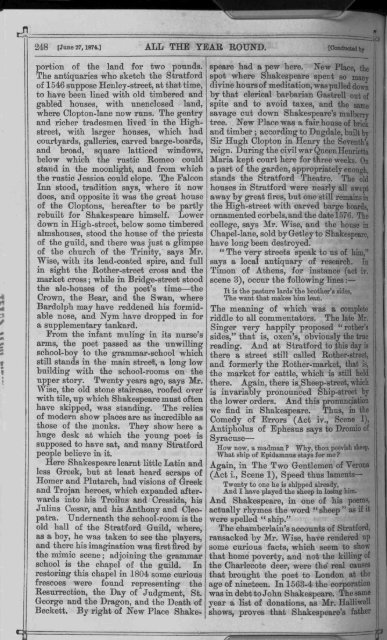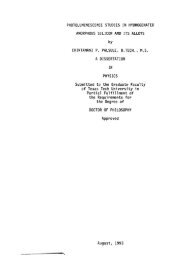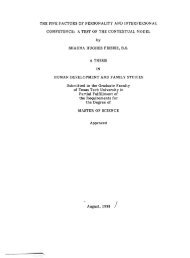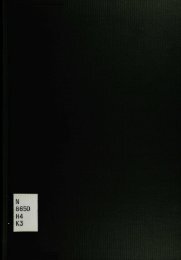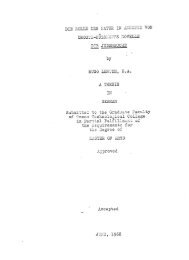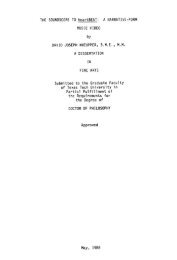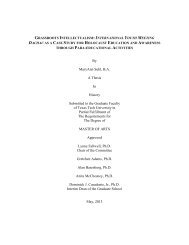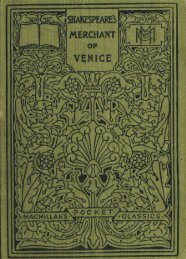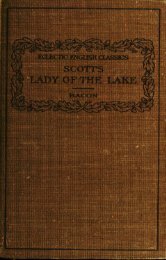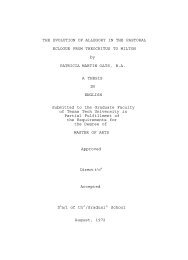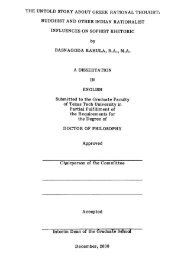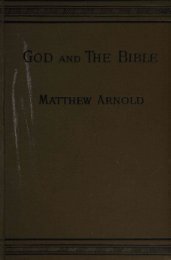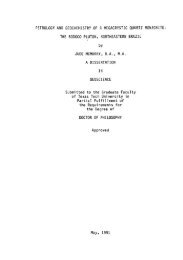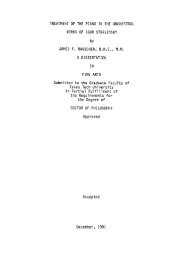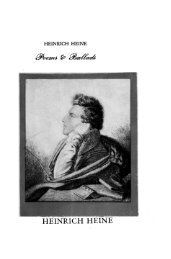A NARROW ESCAPE.
A NARROW ESCAPE.
A NARROW ESCAPE.
Create successful ePaper yourself
Turn your PDF publications into a flip-book with our unique Google optimized e-Paper software.
248 (June 27,1974.] ALL THB TBAB BOUND. [Condncted br<br />
portion of the land for two pounds.<br />
The antiquaries who sketeh the Stratford<br />
of 1546 suppose Henley-street, at that time,<br />
to have been lined vrith old timbered and<br />
gabled houses, vrith unenclosed land,<br />
where Clopton-lane now runs. The gentry<br />
and richer tradesmen lived in the Highstreet,<br />
with larger houses, which had<br />
courtyards, galleries, carved barge-boards,<br />
and broad, square latticed windows,<br />
below which the rustic Bomeo could<br />
stand in the moonlight, and from which<br />
the rustic Jessica could elope. The Falcon<br />
Inn stood, tradition says, where it now<br />
does, and opposite it was the great house<br />
of the Cloptons, hereafter to be partly<br />
rebuilt for Shakespeare himself. Lower<br />
down in High-street, below some timbered<br />
almshouses, stood the house of the prieste<br />
of the guild, and there was just a glimpse<br />
of the church of the Trinity, says Mr.<br />
Wise, vrith its lead-coated spire, and full<br />
in sight the Bother-street cross and the<br />
market cross; while in Bridge-street stood<br />
the ale-honses of the poet's time—^the<br />
Crown, the Bear, and the Swan, where<br />
Bardolph may have reddened his formidable<br />
nose, and Nym have dropped in for<br />
a supplementary tankard.<br />
From the infant muling in ite nurse's<br />
arms, the poet passed as the unwilling<br />
school-boy to the grammar-school which<br />
still stands in the main street, a long low<br />
building with the school-rooms on the<br />
upper story. Twenty years ago, says Mr.<br />
Wise, the old stone staircase, roofed over<br />
vrith tile, up which Shakespeare must often<br />
have skipped, was standing. The relics<br />
of modern show places are as incredible as<br />
those of the monks. They show here a<br />
huge desk at which the young poet ia<br />
supposed to have sat, and many Stratford<br />
people believe in it.<br />
Here Shakespeare learnt little Latin and<br />
less Greek, but at least heard scraps of<br />
Homer and Plutarch, had visions of Greek<br />
and Trojan heroes, which expanded afterwards<br />
into his Troilus and Cressida, his<br />
Julius Ctesar, and his Anthony and Cleopatra.<br />
Underneath the school-room is the<br />
old hall of the Stratford Guild, where,<br />
as a boy, he was taken to see the players,<br />
and there his imagination was first fired by<br />
the mimic scene; adjoining the grammar<br />
school is the chapel ot the guild. In<br />
restoring this chapel in 1804 some curious<br />
frescoes were found representing the<br />
Resurrection, the Day of Judgment, St.<br />
George and the Dragon, and the Death of<br />
Beckett. By right of New Place Shake<br />
speare had a pew here. New Place, the<br />
spot where Shakespeare spent so many<br />
divine hours of meditation, was pulled down<br />
by that clerical barbarian Gastrell out of<br />
spite and to avoid texes, and tbe same<br />
savage cut down Shakespeare's mulberry<br />
tree. New Place was a fair honse of brick<br />
and timber ; according to Dugdale, built hy<br />
Sir Hugh Clopton in Henry the Seventh's<br />
reign. During the civil war Queen Henriethi<br />
Maria kept court here for three weeks. On<br />
apart of the garden, appropriately enough,<br />
stands the Stratford 'Theatre. The old<br />
houses in Stratford were nearly all swept<br />
away by great fires, but one still remains in<br />
the High-street with carved barge boards,<br />
ornamented corbels, and the date 157G. The<br />
college, says Mr. Wise, and tbe honse in<br />
Chapel-lane, soldbyGetleyto Shakespeare,<br />
have long been destroyed.<br />
" The very streete speak to ns of him,"<br />
says a local antiquary of research. In<br />
Timon of Athens, for instance (act iv.<br />
scene 3), occur the following lines:—<br />
It is the paftnre lards the brother's aides.<br />
The want that makes bim lean.<br />
The meaning of which was a complete<br />
riddle to all commentetors. The late Mr.<br />
Singer very happily proposed " rother's<br />
sides," that is, oxen's, obrionsly the trne<br />
reading. And at Stratford to this day is<br />
there a street still called Bother-street,<br />
and formerly the Bother-market, that is,<br />
the market for cattle, which is still held<br />
there. Again, there is,Sheep-street, which<br />
is invariably pronounced Ship-street by<br />
the lower orders. And this pronunciation<br />
we find in Shakespeare. Thus, in the<br />
Comedy of Errors (Act iv.. Scene 1),<br />
Antipholus of Ephesus says to Dromio of<br />
Syracuse—<br />
How now, a madman ? Why, tbou poovish sheep,<br />
What ship of Epidamnns stays for me ?<br />
Again, in The Two Gentlemen of Verona<br />
(Act i., Scene 1), Speed thus laments-<br />
Twenty to one he ia shipped already.<br />
And I have played the sheep m losing him.<br />
And Shakespeare, in one of his poems,<br />
actually rhymes the word " sheep " as if it<br />
were spelled " ship."<br />
The chamberlain's aocounte of Stratford,<br />
ransacked by Mr. Wise, have rendered np<br />
some curious facts, which seem to show<br />
that home poverty, and not the killing of<br />
the Charlecote deer, were the' real causes<br />
that brought the poet to London at the<br />
age of nineteen. In 1563-4 the corporation<br />
was in debt to John Shakespeare. Tbe same<br />
year a list of donations, as Mr. Halliwell<br />
shows, proves that Shakespeare's father


